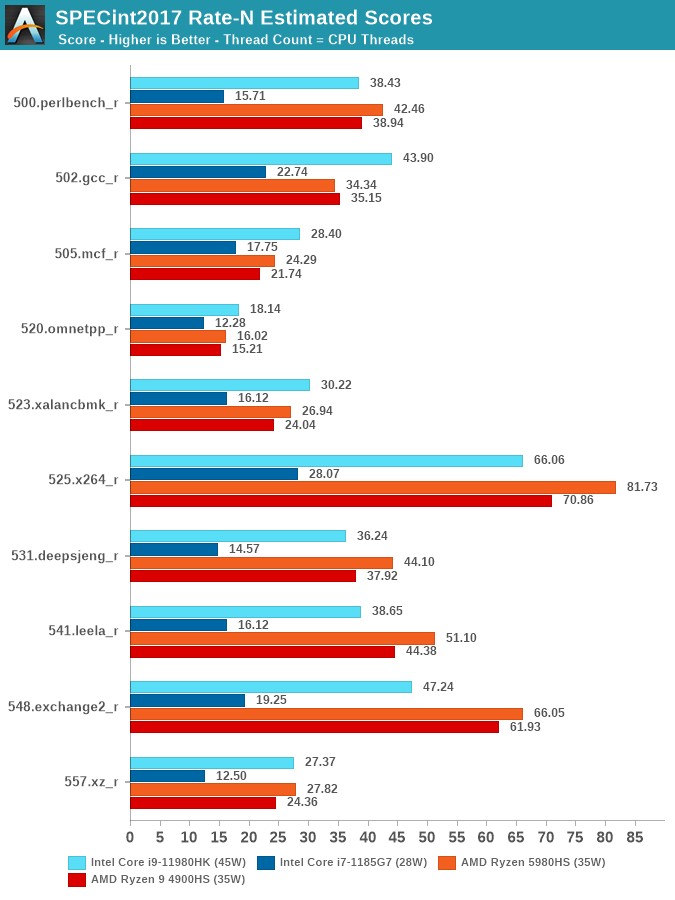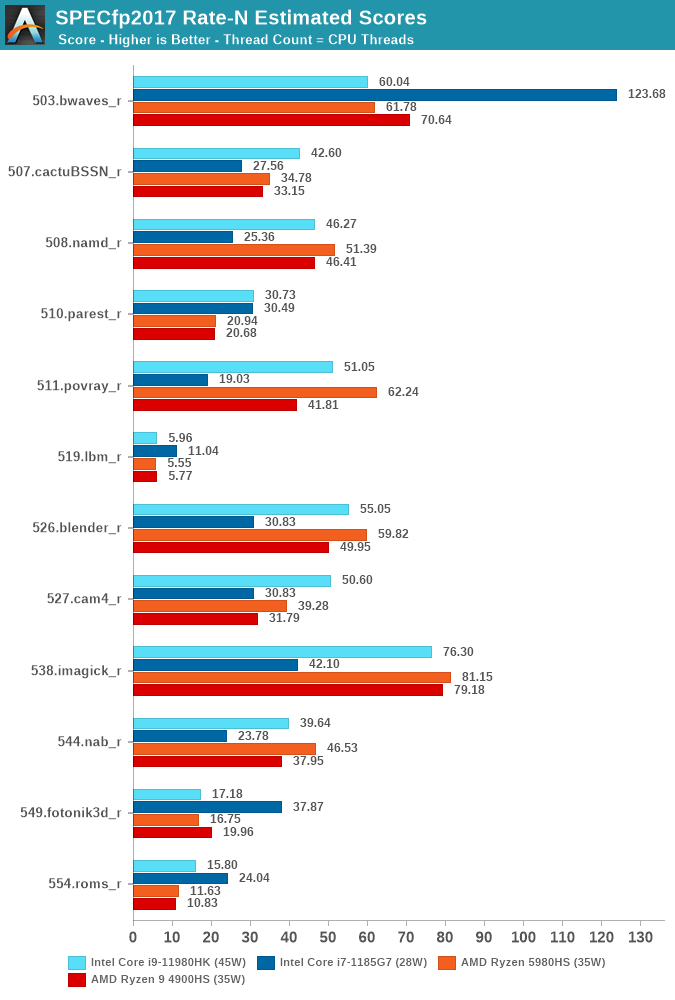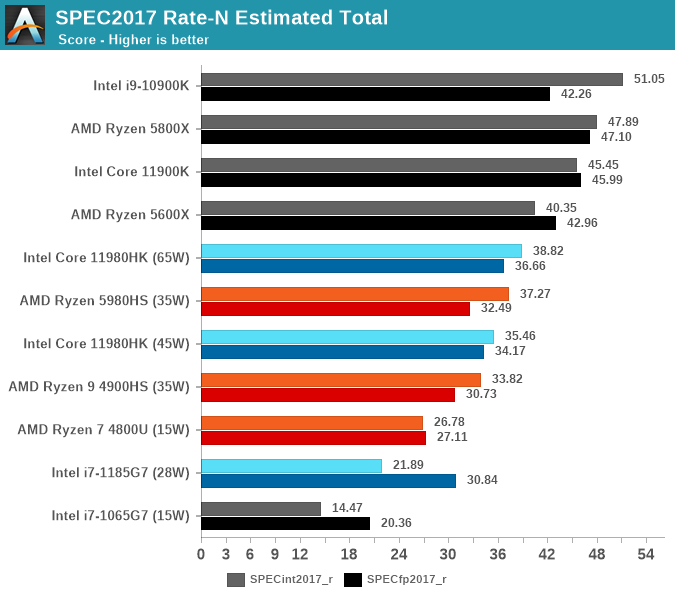Intel 11th Generation Core Tiger Lake-H Performance Review: Fast and Power Hungry
by Brett Howse & Andrei Frumusanu on May 17, 2021 9:00 AM EST- Posted in
- CPUs
- Intel
- 10nm
- Willow Cove
- SuperFin
- 11th Gen
- Tiger Lake-H
SPEC CPU - Multi-Threaded Performance
Moving onto multi-threaded SPEC CPU 2017 results, these are the same workloads as on the single-threaded test (we purposefully avoid Speed variants of the workloads in ST tests). The key to performance here is not only microarchitecture or core count, but the overall power efficiency of the system and the levels of performance we can fit into the thermal envelope of the device we’re testing.
It’s to be noted that among the four chips I put into the graph, the i9-11980HK is the only one at a 45W TDP, while the AMD competition lands in at 35W, and the i7-1185G7 comes at a lower 28W. The test takes several hours of runtime (6 hours for this TGL-H SKU) and is under constant full load, so lower duration boost mechanisms don’t come into play here.

Generally as expected, the 8-core TGL-H chip leaves the 4-core TGL-U sibling in the dust, in many cases showcasing well over double the performance. The i9-11980HK also fares extremely well against the AMD competition in workloads which are more DRAM or cache heavy, however falls behind in other workloads which are more core-local and execution throughput bound. Generally that’d be a fair even battle argument between the designs, if it weren’t for the fact that the AMD systems are running at 23% lower TDPs.

In the floating-point multi-threaded suite, we again see a similar competitive scenario where the TGL-H system battles against the best Cezanne and Renoir chips.
What’s rather odd here in the results is 503.bwaves_r and 549.fotonik_r which perform far below the numbers which we were able to measure on the TGL-U system. I think what’s happening here is that we’re hitting DRAM memory-level parallelism limits, with the smaller TGL-U system and its 8x16b LPDDR4 channel memory configuration allowing for more parallel transactions as the 2x64b DDR4 channels on the TGL-H system.

In terms of the overall performance, the 45W 11980HK actually ends up losing to AMD’s Ryzen 5980HS even with 10W more TDP headroom, at least in the integer suite.
We also had initially run the suite in 65W mode, the results here aren’t very good at all, especially when comparing it to the 45W results. For +40-44% TDP, the i9-11980HK in Intel’s reference laptop only performs +9.4% better. It’s likely here that this is due to the aforementioned heavy thermal throttling the system has to fall to, with long periods of time at 35W state, which pulls down the performance well below the expected figures. I have to be explicit here that these 65W results are not representative of the full real 65W performance capabilities of the 11980HK – just that of this particular thermal solution within this Intel reference design.










229 Comments
View All Comments
schujj07 - Monday, May 17, 2021 - link
You are comparing a gaming laptop against a high end professional laptop. First the 4900HS is a 35W CPU and the 10810U is a 15W CPU. If both laptops have equally size batteries, the one with the lower TDP "should" have longer battery life. On top of the the G14 has a 120Hz display and a dGPU. Both of those will pull extra power and the screen was specifically talked about in reviews of the laptop. Setting the screen to a 60Hz refresh rate instead of 120Hz significantly increased battery life. Finally the weird freezes is most likely due to the dual GPU design and switching between the iGPU and dGPU. Unless you are using so much RAM that you are page swapping.Otritus - Wednesday, May 19, 2021 - link
@schujj07 I have the same zephyrus laptop as morello159. I haven't experienced weird freezes when switching between gpus on mine, or my old laptop with an intel processor and nvidia gpu, so optimus working isn't likely to be causing the freezing. The random high power draw is a valid complaint though. I think the randomness is caused by Asus's turbo settings, which was mostly fixed by me modifying power limits and disabling turbo. But, the default experience is the processor randomly boosting ridiculously high when it should be in a near idle state and not clocking anywhere near as high. Like the chip randomly pushes all 8 cores to 3.8Ghz, when it should be running in the 1.4-1.7Ghz range.bji - Monday, May 17, 2021 - link
Why should I care AT ALL that one platform has been more stable *for you* (your words)? You are irrelevant. Just one piece of anecdotal data.Calin - Tuesday, May 18, 2021 - link
They are trading blows in performance, but AMD is doing that on 35W instead of 45W for Intel.For manufacturers that use the same chassis with Intel AND AMD processors, the Intel one will run hotter, be noisier and/or have lower battery life when working hard (I don't seem to find anything related to idle/low power consumption).
jenesuispasbavard - Monday, May 17, 2021 - link
If you're planning on further testing, maybe using Intel XTU you can limit the PL1/PL2 to 45W and see how that performs?jenesuispasbavard - Monday, May 17, 2021 - link
Maybe I should scroll to page 2 before commenting on page 1...vyor - Monday, May 17, 2021 - link
I'm sorry, but your SPECFP2017 results are just wrong. There is no possible way that the 1185G7 is faster than the 11980HK by 2x in 503.bwavesThat's just absurd, especially when every other test bar 3 shows the exact opposite results, and even of those that show similar results it isn't nearly to the same degree baring 549.fotonik, and that one has the 4900HS somehow being faster than the 5980HS.
So no, your testing is just wrong and broken.
Otritus - Monday, May 17, 2021 - link
The 1185G7 being twice as fast is a little questionable, and possibly the results for the Tiger Lake processors were switched accidentally.As to the 4900HS being faster than the 5980HS in one very specific subtest, I suppose companies have never released a new CPU architecture slower than the old one. That's why Bulldozer was well received for its incredible performance over Thuban. Rocket Lake was well loved for consistently beating Comet Lake and Zen 3 in gaming, with the 11900K always at the top of the chart. Broadwell-S of course isn't better than Skylake or competitive with Coffee Lake in gaming.
vyor - Monday, May 17, 2021 - link
Except that Zen3 is consistently faster in almost every way.Otritus - Monday, May 17, 2021 - link
Keyword "almost"Zen 3 does not win every benchmark over Zen 2, just the vast majority of them due to superior clock speeds and IPC. In 1 very specific subtest, out of all the test conducted, is it really unreasonable to see the older architecture get a win. The last time I can think of a new architecture winning every single benchmark was Conroe. Sandybridge might also get this title with workloads that didn't need more than 4 cores, but I don't exactly recall. Remember IPC is an average of performance at a given frequency, so if a few benchmarks have negative improvements in IPC, but most have large positive improvements, you can easily see a 20% IPC uplift.